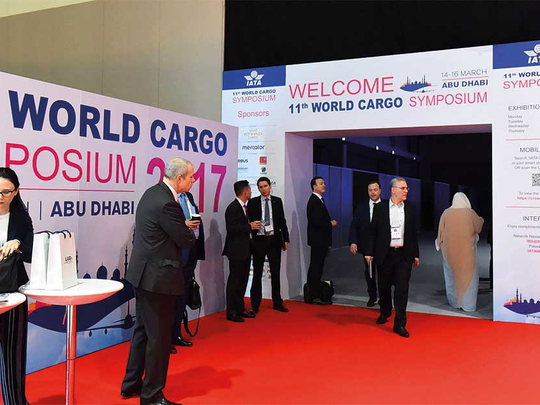
Abu Dhabi: At the 11th World Cargo Symposium in Abu Dhabi this week, international industry experts almost unanimously echoed one buzzword more than any other — innovation.
And it wasn’t always about innovation to stand out and excel; it was about the need for constant innovation to avoid lagging behind already-high expectations from customers both in passenger and cargo travel.
In a speech, Alexandre de Juniac, director-general and chief executive officer of the International Air Transport Association (IATA), a trade group of the world’s airlines, said carriers “must find a way to accelerate the pace of change.”
“Market expectations are evolving. The fast-growing e-commerce and time- and temperature-sensitive goods market demonstrate the need for quality. The speed with which companies like Uber, booking.com, or Airbnb disrupted their respective industries tells us that we must constantly innovate,” de Juniac said.
He added, “Innovation is happening in air cargo. For example, many of you use smart GPS solutions to track the location and condition of high-value [shipments]. The use of sensors, analytics, and digital data can allow us to respond dynamically to market changes during shipping. The question is; what other value can we unlock?”
De Juniac said the key for airlines and cargo carriers to innovate and provide better services is to use data effectively and efficiently. By leveraging data and new technology, air cargo carriers can streamline their operations, cut costs, and raise efficiency, he said.
De Juniac said e-commerce and specialised cargo (such as transport of temperature-sensitive health care products) also provide “significant opportunity” for the cargo sector to grow and innovate.
The CEO later told reporters that the aviation industry has been trying to innovate in the passenger and cargo transport sides for years, but it was only recently that the pace of innovation in cargo has started to accelerate.
“That is a combination of technological innovation but also successful partnerships and a strong push coming from international organisations such as WTO (World Trade Organisation) and IATA. And it’s good news; we cannot remain in the 16th century,” De Juniac said.
But it wasn’t just IATA highlighting the need for innovation in the industry.
James Hogan, president and chief executive officer of Etihad Aviation Group, described innovation in aviation as “fundamental.” He said Etihad was working with Abu Dhabi’s Masdar Institute of Science and Technology on new technology that includes biofuels and other ways to raise efficiency and “stretch the boundaries in cargo.”
In November 2016, Etihad Airways showcased of the latest digital applications it was testing out and how they could transform the future of air travel. Those applications include augmented reality and artificial intelligence to provide more personalised services to passengers.
A month earlier, the airline’s chief executive hinted that the “next big break” in improving guest experience would come from personalised services to suit the individual requirements of each guest rather in aircraft improvements.












